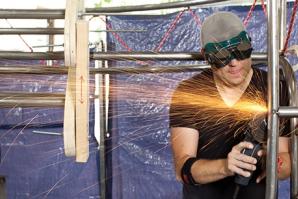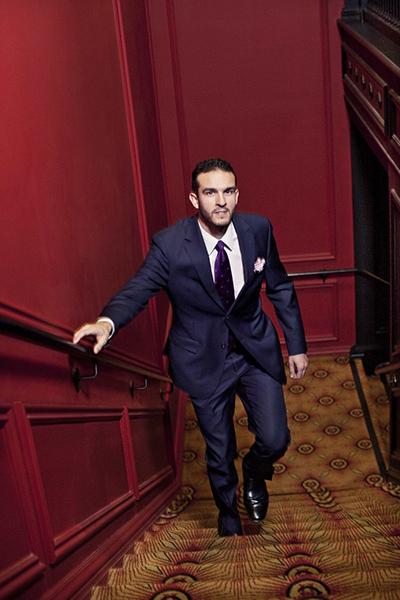2014 has been dubbed the Year of the Young Professional, and for good reason. This is the year the city’s emerging creators, connectors and campaigners will surface full force on a collective mission to revamp antiquated civic and corporate structures from the inside out.
“Sacramento suffers from status quo syndrome, and young professionals are saying as a group, ‘We don’t want to think outside the box. We want to blow up the box,” says Emilie Cameron, chair of Metro EDGE, the young professional program of the Sacramento Metro Chamber. With a 500-strong roster of diversely engaged members, it’s become the Capital Region organization to watch.
This month, Metro EDGE, in partnership with more than a dozen other YP organizations, will host some 500 young professionals at the Wells Fargo Pavillion for the Emerge Summit, a first-in-the-state event created for and by today’s newest leaders.
Which business skills should we develop to create a meaningful impact? How do we make our voices heard and respected in the political sphere? What tools do we need to shape nonprofit boards?
The half-day summit seeks to address such questions, spur innovation and inspire attendees to help turn Sacramento into a world-class destination that attracts and retains talent.
This may sound all-too familiar to the city’s well-seasoned residents. The war whoops of “New and improved Sactown!” and “Change is coming to the Capital Region!” might smack of revival efforts from decades past. But for today’s up-and-comers, this new territory is a goldmine too rich not to seize.
“There’s a reason this movement is being led by young people,”
Cameron says. “We don’t have the history of, ‘We tried it before
and it didn’t work.’”
But more than passion separates the new school from the old. This
diverse, tech-savvy generation thrives on collaboration,
brainstorming and sharing resources under the umbrella of a
common objective: making the Sacramento region a premier place
for people to live, work and play.
Crossing barriers also means cooperating with private, public and nonprofit sectors. There’s a commitment to building a strong young network, which Cameron says Sacramento has traditionally lacked. As a result, this new movement has been met with its share of resistance, to be expected. The concept of collaboration doesn’t exactly mesh with the individualistic, me-first mentality of boomers, Cameron says. But these young professionals are refusing to take no for an answer. Bringing them together was the aim of Metro EDGE, which launched in 2009 to empower future leaders to lift their voices and claim their seats at Sacramento’s proverbial big-kids table.
“Sometimes we think just because we’re young, our voice doesn’t count,” she says. “But whether it’s a dog park next door or an arena next door, your voice does count.”
For Cameron, the Emerge Summit is proof that this new movement will offer more than just lip service to Sacramento and will serve as a catalyst for future change.
“I truly think that in 10, 20 years, we’ll look back and say this was the defining moment when the pendulum finally swung the other way,” she says. “Where else in the country do you have an opportunity to be on the ground floor of a defining movement?”
So who, exactly, is leading this charge?
Verna Sulpizio
Age: 31
Title: Project manager, Civitas
Training grounds: Metro EDGE, Urban Land Institute
Young Leaders Group
Tactical advantage: Connectivity
Weapon of choice: Her network
Philosophy: If you don’t like it, get in there and do
something about it.
“The first Metro EDGE event I attended was very clique-y and unwelcoming for new people,” she says. “It felt more like a sorority than a business association.” Through her experience working for the West Sacramento Chamber of Commerce, she knew that chambers could be effective with the right people involved. Sulpizio saw in Metro EDGE an opportunity “to get involved and create an environment that was welcoming and professionally supportive for all.”
So Sulpizio joined and eventually chaired the organization’s networking and events committee, implemented a greeting program and taught other members a better way to welcome people. The program improved dramatically.
“I knew I could offer more than just planning events, and I saw this opportunity to connect young professionals with politics,” she says. Sulpizio was elected to fill Metro EDGE’s political action committee seat this year.
“We have this new role, a seat at the table, and it’s our responsibility to act,” she says. “You get the politicians you deserve, and if you want to change how things are done, you have to get involved.”
Left to right: Joshua Wood, Erika Bjork, Jamie Taylor

Joshua Wood
Age: 31
Title: Executive director, Region Builders Inc.
Training grounds: Nehemiah Emerging Leaders Program,
California State Assembly Fellowship Program
Tactical advantage: Rallies people through social media
to drive change
Weapon of choice: Twitter
Philosophy: Defend the home court.
In the early 2000s, when the Sacramento Kings were “the greatest show on court,” according to Sports Illustrated, Joshua Wood was at Sacramento State, discovering a knack for politics. He eventually became student body president and pushed for better student programs that would benefit the entire community.
Since then, Wood has been a rising power player in local politics, launching Region Builders Inc., a commercial building trade group; and fighting to ensure that zero dollars go to companies bent on damaging the city. His message was heard loud and clear when he helped expose Chris Hansen, the Seattle billionaire who tried to derail plans to develop Sacramento’s downtown arena.
“We’re not going to let out-of-town, Trojan Horse, special interests take away jobs that our region needs to survive,” he says.
He also pushed the Sacramento City Council to review its long-standing ban on big-box department stores. According to Wood, every business opportunity should be available for cities and counties in the region to evaluate on a project-by-project basis.
“I support things that create jobs for Sac,” he says. “After the arena, we’ll take on green building, and we’ll keep taking things on until this region prospers.”
As the relentless megaphone for oft-ignored local builders, Wood has gained the support of senior leaders, primarily because they know he means business and, “People of all generations want to be around people who don’t rest on their laurels,” he says.
**
Erika Bjork
Age: 38
Title: Vice president of marketing and communications,
Sacramento Republic FC
Training grounds: Metro EDGE
Tactical advantage: Builds powerful brand messaging
Weapon of choice: Her voice
Philosophy: Keep telling the story.
It was by accident that Erika Bjork found herself driving through East Sacramento for the first time. She recognized the neighborhoods immediately as places she would like to live. But the reasons behind her desire didn’t become evident until she took a job at AugustineIdeas, a marketing agency in Roseville, where she managed a number of destination accounts.
“As locals, so often we don’t think of the story of where we live,” Bjork says.
She began to see the strategy behind location-based storylines and the ways those messages connect communities.
“One of the greatest ways to stimulate an economy is to bring outside dollars in. There are really only two ways to do that. Bring in a Fortune 500 company or tourism,” she says. But sometimes, it’s just as important to tell the story to locals.”
Like a soapbox revivalist, Bjork has begun preaching the merits
and necessity of placemaking.
“If part of what I can do is bring a voice to regional issues,
whether through social media or events or in a bar, and get other
people talking about it, the message will get through,” she says.
Last year, when the Sacramento Metro Chamber took a delegation of business leaders to meet with government officials in Washington D.C., Bjork brought Blue Diamond almonds and Ginger Elizabeth chocolates as thank you gifts that would educate others about Sacramento’s attributes.
She’s been pressing others to do the same, whether it’s engaging with people in other cities or chatting up friends about the region’s qualities.
“Too often, when we look at ourselves, we define what we’re good at based on the jobs or skill sets we have,” she says. “I might be decent at writing a press release, but I have a passion for bringing people together. That’s the theme I see in every job I’ve done.”
**
Jamie Taylor
Age: 41
Title: Assistant file clerk, Secretary of the
Senate
Training grounds: Nehemiah Emerging Leaders Program
Tactical advantage: Likability in the world of
politics
Weapon of choice: Reliability
Philosophy: Reputation is everything.
Taylor started his career in politics as a legislative aid for San Diego City Councilmember Juan Vargas. His job was to answer the phones and schedule meetings.
“I learned who got access and why it was that they got a call back. They were the relationships that had lasted longer than 15 minutes, the long-standing relationships,” he says.
It was often the strength of those relationships that spelled the difference between a winning campaign and defeat. And the true value of those relationships came into full focus the morning after a loss, when the real supporters would show up looking for the next fight.
“I learned the importance of your word, your reputation and how well you know the other person on the phone. If you’re asking to engage or collaborate for a common purpose, before you get to that, you’ve got to make friends.”
Young professionals, he notes, carry a degree of skepticism about authority. But as boomers retire, he says, tomorrow’s leaders must humble themselves to guidance, and communication gaps must be made secure for any real progress to be made moving forward.
“It’s not that the younger generation can’t learn,” he says. “But there needs to be a safe environment for the younger generation and older generation to get together. I have a group of friends involved in local efforts to support strong economic development. Now, I link the right people who do 90 percent of the work with the right people who can fill that 10 percent void.”
**
Michael Marion Jr.
Age: 35
Title: Dean of students, Cosumnes River College, and
adjunct professor, Drexel University Sacramento
Training grounds: Nehemiah Emerging Leaders Program,
Metro EDGE, Leadership Sacramento
Tactical advantage: Knows when to listen
Weapon of choice: Diplomacy
Philosophy: Wise communication reaps reward.
Ever locked yourself out of your car? You can see the keys inside, but you just can’t get in without the necessary tools. That’s pretty much how Michael Marion Jr. felt when he arrived in Sacramento from Portland. He was ready to get involved, but for a young professional, the support system wasn’t there.
That’s changing now, he says, primarily because young leaders are knocking on doors so hard that older, established cohorts have no choice but to listen.
“It tends to be the old boy’s club,” he says. “Unless you’re part of that network, it’s going to be hard to break through the ceiling. But in Sacramento, the tide is changing, and young professionals are starting to be embraced.”
Marion sought out like-minded, forward-thinking colleagues, regardless of age and industry. “I believe if you surround yourself with good people, you have to elevate your game. Iron sharpens iron,” he says. As vice chair of Metro EDGE, he’s pushing to make Sacramento a city of growth for leaders-in-progress.
But he’s also quick to acknowledge the senior leaders who laid the way. Sometimes, he says, young professionals have to rattle the cage. But other times, its necessary to work within the status quo to gain leverage.
“Too often, we’re eager to speak and don’t take the time to understand the situation and where individuals are coming from,” he says. “Doing that allows me to collaborate better. People who came before us have paved the road, so we need to pay our dues.”
**
Left to right: Emilie Cameron, Jeff Louie

Emilie Cameron
Age: 32
Title: Senior public relations manager, 3fold
Communications
Training grounds: Metro EDGE
Tactical advantage: Insider knowledge
Weapon of choice: Observation
Philosophy: Introversion should not preclude you from
leadership.
Emilie Cameron grew up in Davis, so it was “a big deal to come to downtown Sacramento,” a thriving metropolis of opportunity. After graduating from the University of California, Davis, she moved to midtown as it was receiving an urban makeover, a revelation to Cameron, who saw “people come together for a collective goal.”
But Cameron struggled to connect. She’s shy. “I realized I didn’t have a network,” she says, “other than my close group of friends.”
But to be truly effective, Cameron says, you have to be uncomfortable. “As young professionals, I think it’s inherent that we’re unsure of ourselves. But if you’re comfortable, you’re passive.”
Cameron got involved with Metro EDGE during its founding year. “The first year, I observed and wasn’t involved. The second year, I joined a committee and observed some more. I became a [board] member and again learned and observed,” she says. I spent the past five years learning so I could seize this opportunity,” and chair the entire organization.
Now, she says the next step will be to implement her observations into an action plan, the same strategy she employs with her clients at 3Fold Communications. As the 2014 chair of Metro EDGE, Cameron oversees an expanding network of young professionals across the region, creating opportunities for collaboration and pressing peers to participate rather than watch passively from the sidelines.
“We’re at a tipping point,” she says, “and we want to make sure we tip the right way by empowering that influential voice.”
**
Jeff Louie
Age: 32
Title: Founder and CEO, Capsity
Training grounds: AmeriCorps, Sacramento Asian Chamber
Catalyst Program
Tactical advantage: Social consciousness
Weapon of choice: Mentorship
Philosophy: Business success is about more than cash.
Jeff Louie originally wanted to teach junior high. After graduating from the University of California, Berkeley, he spent a year working with youth in Oakland’s Chinatown through AmeriCorps, a federal community service program. Louie created the area’s first financial literacy program for youth, Holler for Dollars, which taught elementary-age children how to run their own businesses.
Louie says AmeriCorps taught him the potential impact he could have on a struggling community, and he came out of the experience inspired not only by the children he served, but by the team with whom he worked. “It was never about sacrifice,” he says. “We thought the work was important to do.”
Louie’s coworking space, Capsity, is one of only a handful of benefit corporations in Sacramento. B-corps are for-profit institutions with a commitment to social good, in which shareholders judge actions based not just on the dollar but also on the potential impact on society and the environment.
At Capsity, this focus on the common good translates into a cooperative environment of ragtag entrepreneurs whose businesses range from pet sitting to brewing, tech startups and legal services. Capsity also has a fellowship program designed to support fledgling nonprofits.
Louie calls the space a collaborative educational system that represents the next generation of small business developers. “Economically, socially and environmentally, we can’t keep doing business the same way,” he says. “Businesses need to challenge themselves to think not just about how we can eat, but how we can take care of people.”
**
Left to right: Michael Broughton, Darrell Teat, Emily Dutch

Michael Broughton
Age: 38
Title: CEO, Blanket Marketing Group, and CEO,
SacDine.com
Training grounds: Nehemiah Emerging Leaders Program
Tactical advantage: Uses his weekly radio show on the
Wall Street Business Network to engage with entrepreneurs and
executives
Weapon of choice: Black composition notebook
Philosophy: Take matters into your own hands.
Michael Broughton has business in his blood. One of his grandfathers owned a cab business. The other had a landscaping company. As a boy, Broughton would often accompany his mother to AT&T, where she was an executive.
But his road to the private sector had its share of hurdles. Namely, conservative corporate culture. In the late ’90s, Broughton worked as a district sales manager for Yellow Pages. He recalls trying to convince the higher-ups to move the book to the Internet, but he kept getting shut down.
“They said, ‘This is how we do things, and this is how we’ll always do things,’” he says. “If I’m with this company, and the way they’re doing business doesn’t jive with the way I know business should be done, maybe I should take a leap and do business for myself.”
With his advertising and marketing background, Broughton started Blanket Marketing Group, a digital agency specializing in web design, search engine optimization, social media and other marketing strategies. But the venture that put him on the map was the comprehensive local dining guide, SacDine.com.
This was all part of his plan. When Broughton was in eighth grade, he had to detail his life goals. He wrote that he wanted to help people, be a businessman with his own company and have Donald Trump as an employee.
“I’ve got the other ones handled,” he says. “I’m just waiting for Donald to hand me his résumé.”
**
Darrell Teat
Age: 35
Title: Managing director of emerging markets, Nehemiah
Corp. of America
Training grounds: Nehemiah Emerging Leaders Program,
Sacramento Entrepreneurship Academy
Tactical advantage: Builds relationships through
service
Weapon of choice: Smartphone
Philosophy: Face-to-face contact and knowledge-sharing
are key.
After letting go of his hoop dreams, Darrell Teat decided to give the corporate world a shot. His first venture after graduating from Santa Clara University was a mobile car wash company. He even landed a contract with Valley Fair Mall, where he rented 40 parking stalls. But after moving to Elk Grove, he realized absentee business management wasn’t too lucrative, so he sold it off.
In a new city and armed with a communications degree, Teat re-evaluated his goals and identified Nehemiah Corp. of America, a social enterprise and development corporation, as a conduit by which to reach them. Nehemiah’s 10-month Emerging Leaders Program prepared him for civic engagement plus his current position, assisting Nehemiah CEO Scott Syphax with high-priority projects.
For the past three-and-a-half years, Teat’s primary responsibility has been raising capital from private equity and institutional investors. But the essence of what he does, he says, consists of collecting information. He reaches out regularly to professionals in the development sector, simply asking if they’ll share their insight.
“It’s about collecting that information and then developing a strategy to deploy that information for the purpose of maximizing results,” he says. “I put that into play every day, whether it’s on the boards that I serve or with the people I connect with. It’s about helping them build a strategy to achieve their professional goals.”
Teat believes those who have knowledge should give it willingly to those who seek it.
“There are now many young professionals in the Sacramento Region at a point of tension. They believe they have the skills, insight and capacity to take hold of leadership,” he says. “Yet there is a group of senior professionals that are not ready to give it up.”
***
Emily Dutch
Age: 33
Title: Associate director of student affairs, Drexel
University Sacramento
Training grounds: Metro EDGE, Nehemiah Emerging Leaders
Program
Tactical advantage: An inquisitive nature
Weapon of choice: Poignant questions
Philosophy: Pick a pond that emphasizes your splash.
Emily Dutch isn’t homegrown. She landed at the University of the Pacific from Florida in large part because of its smaller size, an intimate setting where Dutch felt she could grow her network authentically.
She then spent seven years in the Bay Area working in higher education before she left, primarly because, “It was too big a pond for young people to really make a splash.”
Dutch joined Drexel University Sacramento in 2009 as the institution’s first program manager.
“Sacramento is not too small, but it’s just small enough that you can more easily connect with other people and their networks,” she says.
Dutch was soon promoted into her current position as the associate director of student affairs — where she links students to resources both within the university and throughout the city.
She’s also the go-to person for transplants seeking a spot to study over a cup of coffee (Chocolate Fish), a way to pass the weekend (Second Saturday, Midtown Farmers Market) or a quiet route for an evening stroll (“East Portal Park is a hidden gem,” she says).
Dutch refers to herself as an “explorer by nature,” and she uses that as well as her transplant status to help students not only feel at home in Sacramento but to connect to the business resources that will benefit their careers and, hopefully, keep them in the city after graduation.
“Talent retention is about putting Sacramento on display as not just a campus but as a community,” she says.
**
Basim Elkarra
Age: 34
Title: Executive director, Council on American-Islamic
Relations Sacramento Valley
Training grounds: American Leadership Forum, Nehemiah
Emerging Leaders Program
Tactical advantage: Intercultural and interfaith
perspective
Weapon of choice: His smile
Philosophy: Keep your friends close, and educate the
rest.
Raised in a Muslim family and self-described “as American as apple pie,” Basim Elkarra says Catholic school allowed him to experience and educate different cultures and religions at a young age.
After the 1993 raid on a Branch Davidian compound in Waco, Texas, one of the nuns defined “cult” for her class by drawing a comparison to Islam. Elkarra raised his hand and explained that Islam is one of the largest religions in the world, outlining its similarities to Christianity. He also got in the habit of bringing baklava to school on Islamic holidays as a nod to interfaith education.
After 9/11, his diversity awareness motivated him to get involved in community activism at the University of California, Berkeley. From there, he was chosen to lead the Counci al on American-Islamic Relations in Sacramento.
With CAIR, America’s largest Islamic civil liberties group, Elkarra meets with media and government and holds diversity trainings for corporations and law enforcement. He also runs a youth leadership program and maintains a prominent voice in the region’s civil rights and interfaith community.
“I treat everyone with dignity, whether you’re a board member or a secretary,” he says.
It sounds easy enough, but it’s harder under the pressure of hate calls and emails about terrorism and the plight of Christians in the Middle East.
“A lot of fellow Americans, they want to understand. I’ve had people call back to ask questions — a little bit of knowledge opens up a lot of doors.”
***
Parrish Geary
Age: 36
Title: Counseling department supervisor, Student
Services, Cosumnes River College
Training grounds: Nehemiah Emerging Leaders Program
Tactical advantage: Meeting people where they are
Weapon of choice: Customization
Philosophy: Teambuild through inclusion.
Parrish Geary talks straight to the point. In his role at Cosumnes River College, he’s responsible for connecting thousands of students with the resources and information they need to succeed. There isn’t time to sugarcoat.
There’s a push to reach out to students in area high schools and
attract them to the college district. That means sending out
representatives to inform students about how to be prepared for
college, while also setting up in-house programs that will
educate future students about where to go and what to do.
“I work in a system in transition. Before, students were kind of
told what they needed to do,” he says. “We come up with policies
and procedures on a regular basis, and you know who we never ask?
The individuals or parties that we’re working for.”
“Once you come in the door, you’ve got to feel welcome and feel like this system will work for you,” he says. “It’s not one-size fits all. When you’re more inclusive with the stakeholders at the table, you tend to produce better results.”
For men of Geary’s generation who grew up in single-family homes, getting to college is a feat within itself, he says.
“I learned early how important it was to reach back and pull people forward, and if the system isn’t working, we’re going to lose students,” he says. “You have to be in the system to make changes. You need to make sure you move up, get in these leadership roles and bring your voice to the table.”
**
Did we miss anyone? Let us know in the comments!
Recommended For You

Independents’ Day
Look out 9-to-5, the freelancers are coming
Casey Marshall is hunched over his phone, furiously scrolling through his Twitter feed in search of a photo of Waste Management’s promotional robot, whose broken axle he fixed back in March. “Someone came into the Hacker Lab and needed his robot repaired,” he says, grinning, “and I was like, ‘I gotta do that.’”

Brain Drain
How can Sacramento keep its millennials in the mix?
About a decade ago, as a financial analyst for Intel, I lived in the suburbs of Santa Clara and frequently traveled to Folsom. It was a good job, especially for a kid straight out of college — decent pay, strong company and the lure of glittering stock options.
So I left.







